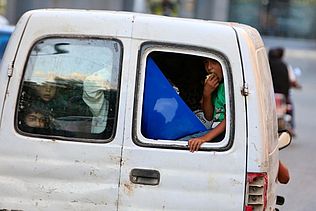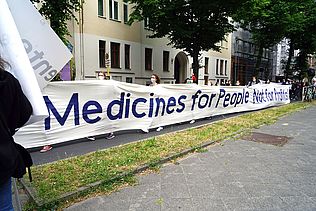"Your governments and people in the rich countries have to understand that we only have a future on this planet together and that no one is safe until everyone is safe," establishes Rene Loewenson right at the outset of the interview. The epidemiologist from Zimbabwe heads the medico partner organisation Training and Research Support Centre (TARSC), which among other things performs health education in the context of large mining projects. In addition to her, medico colleague Dieter Müller and I interviewed five other medical workers and health activists from the Global South at the beginning of March 2021 regarding the impact of the Covid 19 pandemic in their countries and the influence of intellectual property rights on the supply of vaccines and medicines there.
Here in Germany, the vaccination campaign may be making rather slow progress. For most people in the countries of the South, it is still far off in the distance. The whole drama can be witnessed especially in Brazil, where a health and hospital emergency has been declared in several provinces, including Sao Paulo. Bed occupancy is close to 100 percent, with rising infection rates and the highest death rates in the world. This can be attributed to Bolsonaro's policies, but also to the fact that in Brazil, like in many other countries in the South, national capacities for vaccine research and production have been cut back in recent decades. Delen de la Paz, a physician and coordinator of the Peoples Health Movement in the Philippines (PHM), and Gabriel García, a Mexican physician who practices in indigenous communities in the state of Chiapas, provide accounts of this. Both countries were largely self-sufficient in vaccines until the late 1990s, sometimes exporting surpluses to neighbouring countries. With the advent of neoliberalism, their own, mostly public, production capacities were privatised or driven out of business by opening the local markets to global competition in the world market. Today's dependence on vaccine supplies from a few world market leaders from the North is thus a relatively recent effect of neoliberal globalisation, as Delen de la Paz points out.
Inequality as a pandemic driver
We asked Leslie London about the reasons for the disastrous impact of the pandemic in South Africa. The professor of public health and activist at PHM in South Africa highlights the role of social inequality in the society and the health system. In particular, he views widespread unemployment and informal employment as the underlying cause of the high number of cases. Very few people are able to benefit from the safety of a home office. On the positive side, he says, experience gained in HIV-AIDS work can be drawn on in the current pandemic. This includes participatory health approaches with so-called community health workers and free access to the necessary medication. The development of the country's own pharmaceutical production capacities, he notes, and the abolition of patent protection, not only for Covid-19 vaccines, will be important steps in the future.
Antonio Martins expresses surprise regarding the lack of protest in the Global North about the pharmaceutical companies having received public funds to develop vaccines and that they can now sell these vaccines at high prices to respective governments. In the interview, the editor of the left-wing online news portal and medico partner Outras Palavras criticises the concept of intellectual property, which makes it possible in the midst of a global health crisis to make vaccines scarce and offer them at top prices. The fight against the pandemic, he argues, must therefore also push for a strengthening of the "commons", i.e. common goods, and the creation of free access to knowledge, technology and education worldwide.
What will the world look like after the pandemic? There is an urgent need to reshape North-South relations, according to Rangarai Machemedze from Zimbabwe. The social scientist works on global health policy at the medico partner Regional Network on Equity in Health in East and Southern Africa (EQUINET) and criticises the power bestowed on pharmaceutical companies by patent protection within the WTO and WHO. Even if the move by the governments of South Africa and India to suspend patent protection within the WTO is correct politically, he says, an exemption does not solve the fundamental problem. Machemedze sees this in the fact that the patent system assigns priority to the profits of companies over the global right to health.
In addition to the question of access to vaccines, the people we interviewed are concerned about increasingly authoritarian tendencies in their countries. Human rights violations are being systematically committed under the pretext of fighting the pandemic. It is not only authoritarian regimes that are suspending fundamental rights and acting more repressively. The Philippine government under President Duterte, for example, passed a new anti-terror law that has triggered a bloody crackdown on opposition elements, as Delen de la Paz reports. She insists that the emancipatory struggle for the right to health must therefore always be understood as a struggle for a self-determined life in a comprehensive manner.




